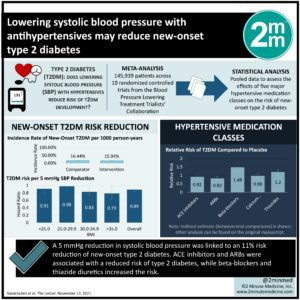#VisualAbstract: Lowering systolic blood pressure with antihypertensives may reduce new-onset type 2 diabetes
1. A 5 mmHg reduction in systolic blood pressure was linked to an 11% risk reduction of new-onset type 2 diabetes.
2. ACE-inhibitors and ARBs were associated with a reduced risk of type 2 diabetes, while beta-blockers and thiazide diuretics increased the risk.
Evidence Rating Level: 1 (Excellent)
Study Rundown: Management of the microvascular and macrovascular complications of type 2 diabetes often consists of controlling comorbid elevated blood pressures. However, it is not known whether controlling hypertension would decrease the risk for developing new-onset diabetes. This meta-analysis used patient data from previous randomized controlled trials of antihypertensive medications and evaluated the risk of developing type 2 diabetes. The study found that a 5-mmHg reduction in blood pressure was associated with a reduced risk for new-onset type 2 diabetes. Angiotensin-converting enzyme (ACE) inhibitors and angiotensin II receptor blockers (ARBs) were the most effective antihypertensives for reducing diabetes risk, while beta-blockers and thiazide diuretics increased the risk for diabetes. Calcium channel blockers did not have a significant effect on the development of diabetes. A limitation of this study includes the inability to determine whether low blood pressure is associated with a lower risk of diabetes or if certain medications improve diabetes risk through their own pharmacological mechanisms. For example, ACE inhibitors may lower inflammation in the body, which could help protect against diabetes not necessarily linked to hypertension. Nonetheless, this study illustrates the potential benefit of controlling high blood pressure on the risk of diabetes.
Click to read the study in the Lancet
Click to read an accompanying editorial in the Lancet
Relevant Reading: Blood pressure lowering in type 2 diabetes: a systematic review and meta-analysis.
In-Depth [meta-analysis]: This meta-analysis obtained randomized controlled trial data comparing antihypertensives in primary and secondary prevention programs from the Blood Pressure Lowering Treatment Trialists’ Collaboration (BPLTTC). Patients with pre-existing diabetes were excluded. The final cohort included 145 939 patients (60.6% men) across 19 trials with at least 1000 persons-years of follow-up data. Median follow-up was 4.5 years. There were 9883 patients diagnosed with diabetes during this follow-up time. This was calculated to be 16.44 (95% CI 16.01-16.87) events per 1000 person-years in the comparator group and 15.94 (15.47-16.42) in the intervention group. The comparator group was made up of placebo groups and less effective antihypertensives in the RCTs. A 5-mmHg reduction in systolic blood pressure resulted in an 11% reduction in risk for diabetes (hazard ratio 0.89 [95% CI 0.84-0.95]). In terms of specific antihypertensive classes, beta-blockers (relative risk 1.48 [1.27-1.74]) and thiazide diuretics (RR 1.20 [1.07-1.35]) were found to increase the risk of type 2 diabetes. In contrast, ACE inhibitors (RR 0.84 [0.76-0.93] and ARBs (RR 0.84 [0.76-0.92]) were found to reduce the risk of diabetes compared to placebo. There was no difference in risk between calcium channel blockers and placebo.
Image: PD
©2021 2 Minute Medicine, Inc. All rights reserved. No works may be reproduced without expressed written consent from 2 Minute Medicine, Inc. Inquire about licensing here. No article should be construed as medical advice and is not intended as such by the authors or by 2 Minute Medicine, Inc.








